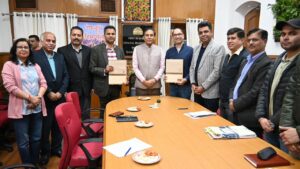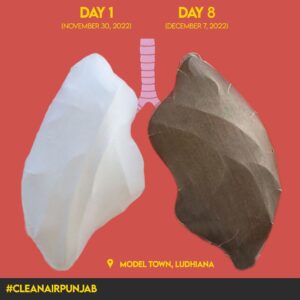In Chennai, the capital city of Tamil Nadu, an interesting experiment – mobile gardening – is on to help the marginalized and poorer sections fulfil their vegetable and nutrient needs to supplement midday meal calories.
Now to translate this into everyday common man language, the poor who do not own even an inch of the land of their own are being given a chance to own and grow their own kitchen gardens and pluck vegetables and leafy nutrients straight from the plants into the kitchen.
This mobile vegetable gardens programme is part of an Urban Horticulture initiative of the Chennai Resilience Center in partnership with Atlantic Council’s Adrienne Arsht – Rockefeller Foundation Resilience Centre and Care Earth Trust envisaged to address the food insecurity among the urban poor. The initiative also aims to build local resilience by applying nature-based solutions to counter the adverse effects of extreme heat and related needs, such as food insecurity.
The first nature-based solution under this initiative is the Mobile Vegetable Garden Kits programme, under which kits comprising organic seeds, soil, fertilizer, and containers are given free to poor residents, shelter homes and Anganvaadis. The people can grow their own vegetables – tomatoes, keerai (spinach), brinjal, and other fast-growing varieties that can supplement their daily diet.
Krishna Mohan Ramachandran, Chief Resilience Officer for Chennai City, said the Mobile Vegetable Garden Kits program created a unique “opportunity to strengthen the resilience of vulnerable populations through a do-it-yourself, low-cost, replicable solution that can feed families during a pandemic.”
The urban farming concept is getting very popular in many nations, and in Paris, it has not been made mandatory for every house to have a green roof. The Mobile Vegetable garden programme not only tries to address the food security aspect, but it also has a positive effect on the environment, as it fights climate change and heatwaves.
As the danger becomes more prevalent in urban settings, introducing tree canopy and greenery on balconies, entryways, windowsills, and rooftops will help to cool heat-prone households.
“The Arsht-Rock Resilience Center saw mobile gardens as an innovative tool to meet immediate pandemic-related food needs while building nature-based resilience solutions that reduce risk to extreme heat in urban areas,” said Rebecca Scheurer, Director of Humanitarian Initiatives, of the Rockefeller Foundation. Scheurer also noted that “The side benefits to this programme are incredible, particularly in the way it empowers marginalized women.”
“Ensuring household food and nutrition security, especially in marginalized communities, calls for well designed, pragmatic initiatives, like Mobile Garden Kits programme. We are proud to be a part of this program,” shared Dr Jayshree Vencatesan, Managing Trustee, Care Earth Trust.
The concept for the Mobile Vegetable Garden Kits program emerged during the COVID-19 pandemic when at-risk urban communities in Chennai experienced unexpected burdens from significant job loss, less mobility under lockdowns, and related inability to afford food.
These burdens were especially felt by displaced day labourers from across India and children who faced acute hunger after losing their mid-day meals due to school closures. In April 2020, Arsht-Rock partnered with the CRC to launch a COVID-19 Relief and Resilience Building Programme.
The program distributed emergency food kits that reached nearly 5,000 people with the help of local partners Pudhiyadhor Charitable Trust and Information and Resource Centre for the Deprived Urban Communities (IRCDUC), with cooperation from the Greater Chennai Corporation Shelters and the Integrated Child Development Service Centres. This program helped families facing myriad challenges compounded by living in informal settlements, resettlement colonies, homeless shelters, and anganwadis (daycare centres).
Ultimately, the Urban Horticulture Initiative and its Mobile Vegetable Garden Kits programme will increase resilience to climate change and create healthy, self-reliant communities in Chennai and beyond, helping “residents secure a greener, cooler, and nourished future”, the officials of the programme believe.







Comments are closed.